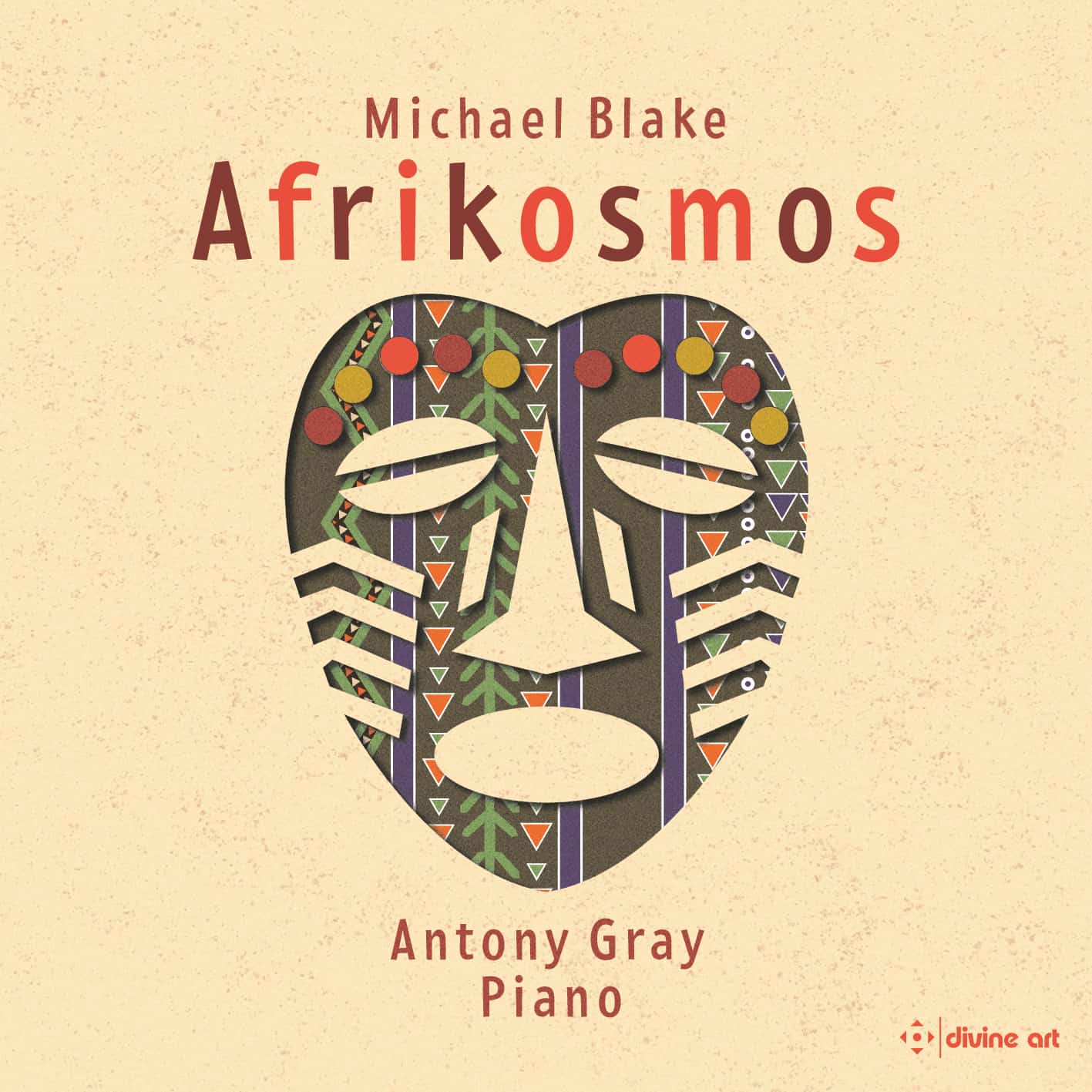Michael Blake: Afrikosmos
Inspired by Bartók’s’Mikrokosmos’ and by the indigenous music from various parts of Africa, South African composer Michael Blake created this magnum opus – like Bartók’s work, in varying degrees of difficulty for young players and experts alike. The recording was made in June 2021 at the Menuhin Hall, Cobham, Surrey by pianist Antony Gray, whose recent Divine Art albums of piano works by Saint-Saëns have met with great success and glowing reviews.
Michael Blake is a South African-born composer and pianist based in London from 1977 and later returned to the “New South Africa”. He has been responsible for post-apartheid New Music initiatives such as joining the ISCM and setting up a new music festival and composers meeting. His musical language draws from African music, experimental film, and African weaving techniques. His works have been widely played around the world and appear on 15 CDs. He currently splits his time living in rural France and Cape Town where he is an honorary professor of experimental composition at Stellenbosch University.
Australian pianist Antony Gray was educated in Victoria, Australia, where he graduated from the Victorian College of Arts and won several awards and prizes. He received a scholarship from the Astra foundation to continue his studies in London with Joyce Rathbone and Geoffrey Parsons. Based in London now, he is regarded as one of the most interesting and communicative performers of his generation, known for his solo and chamber music performances around the world, regular recordings for CD and radio, and his championing of contemporary and neglected composers such as George Enescu, Dussek, Martinů, Malcolm Williamson and John Carmichael. He has recorded 14 discs of solo piano music for ABC Classics, and featured on other recording projects for KNS Classical and other labels.
Track Listing
- Spotted Dikkop and Black Cuckoo
- Linong tsa Lesiba (Song of the Birds)
- African Doves
- if I had Wings
- Walking Song
- Stroll to the Spaza Shop
- Chorale
- Lyric Piece
- Call and Response
- Ntsikana's Bell
- John Knox Bokwe's Plea for Africa
- Heaven's Bow
- iKos'tina
- Variations on a Flute Tune
- Emerging Melody
- Stickfighting Song
- Herding Song
- Threshing Song
- To comfort a child (Lullaby)
- You are a real rascal
- Canon at the Octave
- Wedding Song
- Night Music
- Self Delectative Song
- Latshon'ilanga
- Song for the Evening
- Unevensong
- Dance in Seakhi Rhythm
- Chaconne in Mbaqanga Style
- In Goema Style
- Tickey-draai
- Daar kom die Alibama
- Diary of a Dung Beetle
- Scents of Childhood 1
- Scents of Childhood 2
- Scents of Childhood 3
- Interlocking Hands
- Changing Times with Repeating Patterns
- Five Finger Patterns
- Weave
- Distant Cowbells
- Lusikisiki
- Giyani
- There cried a hippo
- Reedpipe Dance
- Four-note Patterns
- Slow Dance
- Lebombo Bone
- Broken Line
- The music flows jolly as it won't stop forever
- March
- Message from the Nduna
- Ituri Rain Forest
- Reflection
- Two Modes Intersecting
- In the Hexatonic Mode
- Major-Minor
- Patterns in a Heptatonic Field
- Keep left, pass right
- Geyser on! Hat off!
- Stay on path
- The Seven Steps
- Ostinato with Cross Rhythm
- Smoke and Mirrors
- Postcards from South Africa
- Une sonnerie pour G D
- High Fives
- Supermoon
- Sefapanosaurus
- Thirds
- Variations on 4ths and 5ths
- Fifths
- Seventh must fall
- Haiku
- Freedom Day Variations
Reviews
“In this recent release…the 75 pieces which make up the six volumes of Michael Blake’s Afrikosmos, Progressive African Piano Pieces, are beautiful and convincingly presented by pianist Antony Gray…there is much to be enjoyed and admired here.
” —Christopher Baxter
“Quite a few pieces grabbed me. All works are played with skill and feeling by pianist Antony Gray.
” —Barry Kilpatrick
“Blake cites the strong influence of African musical techniques, melodic patterns, and rhythms in shaping these pieces. Australian pianist Antony Gray plays every piece with conviction and skill. The recorded sound is excellent. I can recommend this release to curious listeners interested in exploring new keyboard repertoire, but in a style still tethered to tradition.
” —Henry Fogel
“Antony Gray’s achievement is not merely technical. He is able to sustain the attention throughout via what feels like deep saturation in Blake’s score. Structurally the set seems perfectly considered. This is one heck of a ride into a host of Africanisms, something truly different, truly engaging. It is probably heresy to say that I prefer Blake’s Afrikosmos to Bartók’s Mikrokosmos; but there we are, it is true.
” —Colin Clarke
“It’s all marvellous… Gray is a persuasive advocate, and Divine Art’s engineering has atmosphere and impact. Begin listing your favourite numbers and you’ll need several sheets of paper.
” —Graham Rickson
















